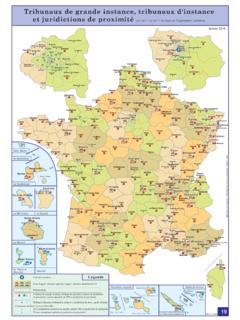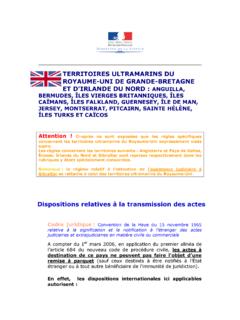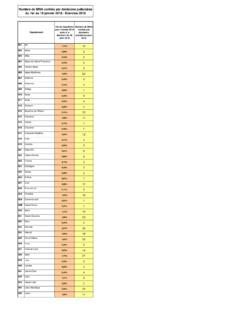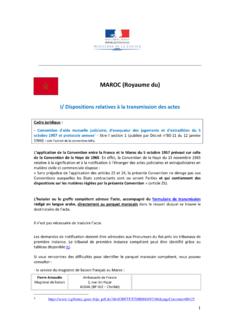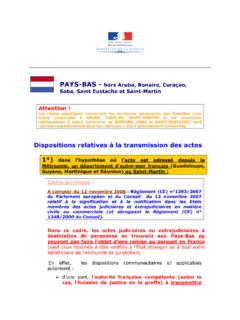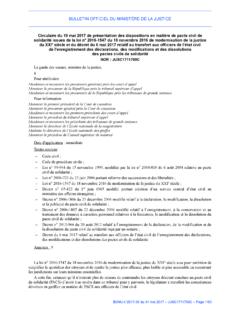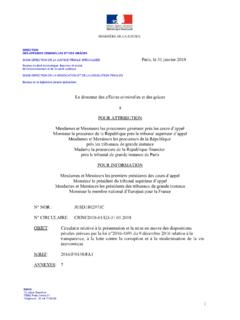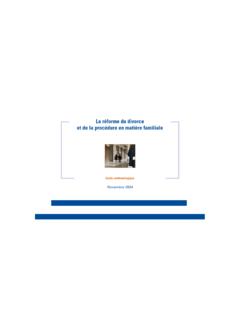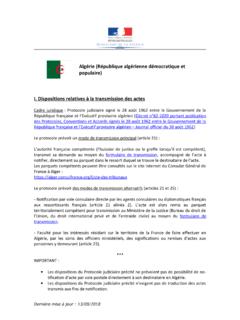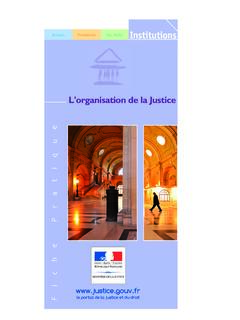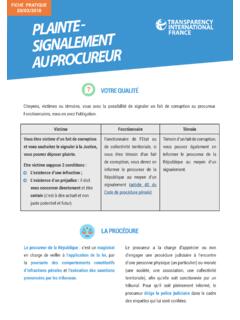Transcription of The French legal system - Minister of Justice
1 The French legal systemJudicial systemAdministrative courtsTraining of judges andpersonnelin the Justice systemThe criminal proceedingsJuvenile Justice systemSentence application and prison system378101113 Judicial SystemConstitution and institutional systemThe fifth French Constitution was promulgated onOctober 4, 1958. The Constitution is the highest normin the internal hierarchy. The Constitutional Councilin 1971 cited the Constitution s Preamble and the Declaration of the Man and of the Citizen (1789) astexts included in the Constitutional Principles. Moreover, the Fundamental Principles of the Republic expressed by the Constitutional Council andthe Environment Charter of 2004 are also part of the constitutional block .The Constitution can be amended either by the Frenchcongress (joint session of both chambers of Parliament)or by referendum.
2 The French Constitution was fondamentaly changedon 23 July 2008 by the constitutional revision bill ofmodernization of the institutions of the Fifth Republic. All branches of Government are affectedby this reform. First, the exercise of the Executivepower is modified. The revision puts an end to theambiguous diarchy between the President of theRepublic and the Prime Minister . Indeed, it recognises the supremacy of the President of theRepublic while it limits his prerogatives. Secondly, aset of measures is devoted to the legislative powerwith the goal to restore to favour the role of Parliament by eliminating some of the harsher instruments of rationalized parliamentarianism introduced in 1958. Thirdly, the constitutional revision deals with judicial power and citizens rightsand certainly the most noteworthy provision here isthe introduction of a new form of a posteriori constitutional review of Constitutional Council has the power to interpretthe highest French and International norms; it alsoensures that the Constitution, the ConstitutionalTexts and Principles are upheld.
3 By interpreting article 55 of the Constitution, the ConstitutionalCouncil has indicated that International and European Treaties are the highest norms. Therefore,the Constitution must be reviewed if it is contrary toany Treaty prior to their ratification. Constitutional Council members are appointed for nineyears (three every three years). Three are appointed bythe President of the Republic, three by the President ofthe Senate and three by the President of the NationalAssembly. Former Presidents of the Republic are ex officio life members of the Constitutional Council. The 1958 Constitution establishes a Democracybased on the Separation of Executive branch is headed by the Prime Minister and the President of the Republic. The President of the Republic is directly elected fora 5-year term renewable one time. He is the Headof State and the Commander in Chief of the powers are defined by the Constitution.
4 Heappoints the Prime Minister and puts an end to theappointment when this one resigns. On the proposition of the Prime Minister , the Presidentappoints the other members of Government. The President of the Republic promulgates the laws aftertheir adoption by the Parliament. He can dissolve theNational Assembly and call for early Legislative branch is bicameral. The NationalAssembly is the main legislative chamber. Judicial System4 Judicial SystemFrance has a legal system stemming from Romanlaw and based upon codified laws. The Civil Codewas drafted in 1804 under Napoleon I. Nevertheless judges have the duty to interpret thelaw and the decisions of the higher courts have acertain influence on the inferior courts even if theyare not bound by any higher court s decision. The lasttime a death penalty was issued in France was in1978. It was then officially prohibited in October1981.
5 The Parliament, both National Assembly andSenate, decided in February 2007, to amend theFrench Constitution in order to include an explicit banof the death penalty. The constitutional statement that No-one shall besentenced to death , makes France the 17th countryworldwide to include prohibition of the death penaltyin its judiciary is independent from the executive andthe legislative powers. There are several categoriesof courts divided into two major branches, a Judicialbranch and an Administrative branch. Judicial Organization The Judicial branchThe civil courts settle private disputes between individuals such as divorce, inheritance, do not impose penalties. The criminal courtsjudge individuals who have committed offences. First degree of jurisdictionThe District courts tribunaux d instancehave jurisdiction for civil matters. They hear personal property claims of under 10,000 euro as well asclaims for which they have exclusive have a criminal division which is the PoliceCourt Tribunal de Police, which handles misdemea-nours in five classes, exclusively with fines.
6 For pettyoffences (for classes one to four) and some civilissues under 4,000 euro it may be a lay judge jugede proximit or a professional judge who hears thecase. For both civil and criminal issues, cases aretried by a judge sitting alone. It is composed of 577 deputies directly electedthrough local votes. They are elected for 5 years renewable. The Assembly has a president electedby his peers. The other chamber is the Senate. The senators are indirectly elected by local elected officials. Since the 2004 reform, they are elected for6 years renewable and half of the Senate is renewedevery 3 years. The president of the Senate is electedby the senators among themselves and is the successor of the president in case of death,impeachment or resignation for medical reasons ofthe President of the Republic. The Legislative branchvotes the law.
7 According to the Constitution, both chambers havethe same power. Bills may be submitted to the Parliament by the Government or by each bill can be amended by the National Assemblyand the Senate but the law must be voted in thesame terms in each chamber. However, if the National Assembly and the Senate cannot agree onthe terms of the law, the Government can give thelast word to the National Assembly after a procedurecalled Commission Mixte Paritaire. Claims over 10,000 Euros are heard by Regionalcourts tribunaux de Grande Instancewhich havegeneral jurisdiction and hear every dispute with anunspecified amount which does not fall within thejurisdiction of another court. Regional Courts alsohave exclusive power over cases involving divorceor proof of paternity. The judges and members of the Regional courts areprofessionals. Generally, Regional courts are set inthe chief town of the Department.
8 Regional courtsalso have a criminal division. Indeed, each regionalcourt has a Criminal court which pronounces penal-ties from 6 months up to 10 years of imprisonment. But other penalties can be decided, such as fines, jour-amende(a fine that is followed by imprisonmentif it is not paid in time) or work for the general interest/ Community and Criminal courts generally rule withthree judges. One of them may be a lay judge .However, they occasionally rule with a single first degree of jurisdiction has also specialistcourts which are Juvenile courts, Labour courts, Commercial courts, social Security courts and Agricultural and Land tribunals. Except for the Juvenile courts, the judges of specialist courts are non professional and are elected or chosen with the respect of equal , The Assize Court, Cour d assises,tries those accused of crimes (murder, rape, armed robbery, etc), attempted crimes, and those accusedas accomplices.
9 The Assize Court is not a permanentcourt, usually meeting every three months for abouttwo weeks. This type of court is found in each department. The composition and modus operandiare unusual, as it is the only court consisting of professional judges (three) and a jury (nine citizenschosen by drawing lots). Certain crimes are tried bya special Assize Court without a jury, such as certainacts of terrorism or acts connectedwith drug dealing. Thejudgments of the Assize Court may be appealed. Public prosecutionIn the Criminal court, the Assize court and the Appellate Assize court, the Public prosecutor exercises criminal proceedings and seeks alternativesanctions adapted to the situation of the accused. Itis characterised by its links with governmental authority for the implementation of Public prosecutionpolicy, the controlling of judicial police activities andcriminal investigation and trial process.
10 The importance of the French Public Prosecutor s role isbased on the principle of prosecutorial discretion. Court of cassationThe last degree of jurisdiction is the Court of Cassation. It is the Highest Court in the judicialFrench system . It is the Court of last resort which sitsin the Hall of Justice in Paris. It succeeded to the Tribunal of Cassation created in 1790. The Court of Cassation does not judge on the facts but checkswhether the laws have been properly applied by theinferior courts in civil and criminal matters. It neversits as an appeal court. Its decisions allow a certainunity regarding the application of laws even if thedecisions do not bind inferior courts. Since 1991, theCourt of Cassation also gives its opinion to the otherjurisdictions on new and complex law issues. The Court of Cassation consists of judges conseil-lers, the Office of the Prosecutor, an AdministrativeOffice of Courts, Higher Council of the Judiciary andspecially certified barristers.
